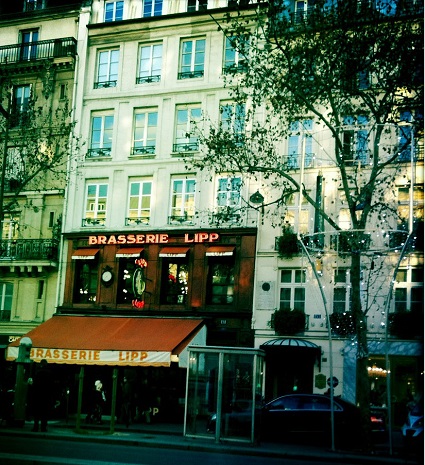Hampshire Exchange in France
Institute d'Etudes Politiques (Sciences Po)
Through Hampshire College's institutional relationship with the Institut d'Etudes Politiques (Sciences Po), students have the opportunity to study the social sciences in France at seven different campuses, specializing in different regions of the world.
Program Details
Location: Various cities/campuses
Term: Fall semester (Sept-Dec), spring semesters (Jan-June), academic year (Sept-June)
Type of Program: Full-time university enrollment
Language of Instruction: English or French; availability of courses in English varies on each campus
Fields of Study: Variety of subjects in social sciences and humanities with a focus on international relations, political science, law, and economics
Prerequisites: Language requirements (and availability of courses in English) differ for each campus. In general, students wanting to take some or all of their courses conducted in French must have completed the equivalent of at least four semesters of college-level French.
About the Institute d'Etudes Politiques (Sciences Po)
Sciences Po is an international center of excellence for teaching and research in the social sciences, with a commitment to understanding the contemporary world through an international perspective. The seven campuses of the Undergraduate College host more than 1,000 students each year from Sciences Po’s 470 partner universities around the world, for a semester or an academic year. Though the main campus is in the heart of Paris, there are six other campuses in cities around France that specialize in certain areas of the world: Reims, Dijon, Menton, Potiers, Nancy, and Le-Havre. All campuses are open to students on the Exchange Programme.
Watch Johnny Chen's Study Abroad Video

Photo by Emma Ogiens 09F, Spring 2012 Program Participant
Academics and the Seven Campuses
Sciences Po offers a multidisciplinary approach to the social sciences on seven different campuses around the country. Each region focuses on a different region of the world, allowing students to focus on the political, geopolitical, and economic issues of the region as it relates to France and the rest of Europe.
While all campuses are open to students on exchange, Paris and Reims are the two campuses that accept most exchange students, and offer curricula more tailored to exchange students. These campuses also provide the most options in English. Exchange placements at the other campuses can be more competitive, and availability of courses in English varies by campus. Students must meet the pre-requisite and language requirements of the individual campus. Language learning opportunities are also available for the regional languages on each campus.
- Paris Campus
Sciences Po’s main (and original) campus, located in the heart of Paris in the 7th arrondissement. It is the only campus that does not have a regional focus. Students studying on Exchange on the Paris campus can enroll in the English Programme (all courses conducted in English), the French Programme (all courses conducted in French), or the English and French Programme (a combination of courses conducted in French or English). Students can choose from a wide range of courses taught in French or in English in the humanities and social sciences: law, economics, history, humanities, political science, sociology, and international relations. They can also take culture courses, which include learning French methodology, and language classes.
- Reims Campus
North America and Africa campus, established in 2010. Located in the Champagne region of France, about an hour northeast of Paris, easily connected to Paris by train. Students studying on Exchange on the Reims campus can choose from four certificate programs in International Affairs and Strategy; European Affairs; Economics and Business; Journalism and Communication. Students can also choose courses across disciplines. Coursework is mostly in English with the option to take French language courses. Courses regarding Africa are offered in French.
- Menton
Mediterranean and Middle Eastern campus, established in 2005. Located in the Provence region of France on the French Riviera. Students have the opportunity to focus on the political, geopolitical, and economic issues of the Mediterranean, Middle East, and Gulf countries. Program is offered in English and French. There are opportunities for Arabic language study as well as for other languages of the region, such as Turkish and Persian.
- Le Havre
The Euro-Asia campus, established in 2007, is located in the harbor-city of Le Havre on the coast of Normandy. Curriculum concentrates on an understanding of world issues concerning Europe and Asia. Courses are primarily in English. Opportunities for language study of the region include Chinese, Japanese, Korean, and Indonesian. French language study is also available.
- Poitiers
The Europe-Latin America campus, established in 2001 and located in the south-west region of Poitou-Charantes. Curriculum focuses on the political, geopolitical, and economic issues of Latin America, in a comparative perspective with the EU, particularly the Iberian peninsula. Courses are primarily in French, with some courses available in English and Spanish. Opportunities exist for language study in Spanish and Portuguese.
- Nancy
The Franco-German campus, established in 2001, is located in the Lorraine Regions (north-Eastern France). Students are able to study the political, economic, and social aspects of the European Union from a comparative perspective between France and Germany. Nancy offers a tri-lingual curriculum (French, English, and German), with most courses in French, with some courses in English and German. Language learning opportunities of the region include German, Italian, Spanish, Russian, and Swedish.
- Dijon
Central and Eastern European campus, established in 2001. Located in the region of Burgundy (eastern France). Courses are all in French. Must have high-level French language ability. Language learning opportunities in Hungarian, Polish, Romanian, Russian, or Czech.
Program Costs
Hampshire Exchange Fees and Financial Aid provides detailed information on the fee policy, withdrawal policy, and how financial aid may apply.
- Tuition Fees: Paid to Hampshire
- Housing and Meals Fees: Paid in country
- Other expenses: Students are responsible for the cost of passport and visa fees; international and local transportation including airfare; books and supplies; international health insurance; and personal expenses.
Housing and Meals

Photo by Sarah Glasser 09F, Spring 2012 Program Participant
Students are responsible for arranging their own accommodations. Housing options, availability, and costs vary on each campus. Students should refer to the housing information for each individual campus. Students are responsible for finding housing on their own. The global education office and each campus at Sciences Po provides various resources to help find apartments.
Eligibility
The Hampshire Exchange program at Institute d'Etudes Politiques (Sciences Po) is open to division II Hampshire College students who have completed at least two years of undergraduate study. Review detailed information on eligibility requirements and policies in the Hampshire College Handbook under Exchange, Field Study, and Short-term Field Courses.
International students (or students without U.S. citizenship) should contact the GEO program advisor for Sciences Po well before applying to figure out how visa regulations will affect their situation.
How to Apply
- Meet with the GEO: Students are required to meet with the GEO program manager for this exchange program before submitting an application.
- Review Applying to a Hampshire Exchange Program: Includes deadlines, application instructions, requirements, and procedures.
- Apply now: Students apply online through the GEO Portal.
Questions?
Contact the GEO program manager:
Yaniris Fernandez
413.559.5542
ymfPR@hampshire.edu

